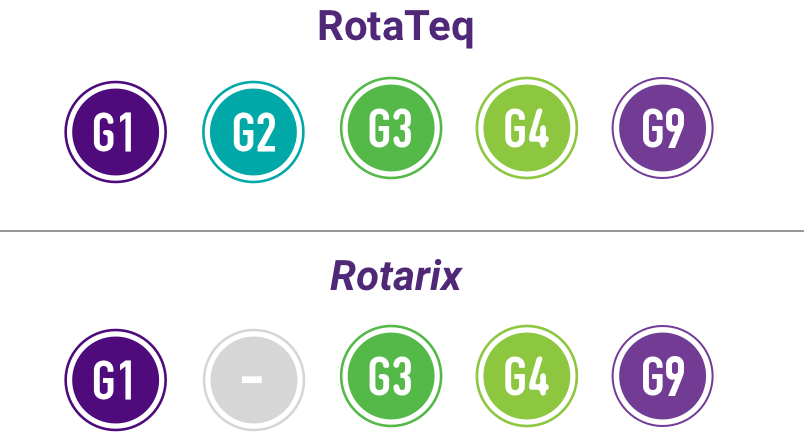Only RotaTeq® (Rotavirus Vaccine, Live, Oral, Pentavalent) is indicated to help protect against RGE caused by 5 strains, including G2.a,b

Why G2 rotavirus strain coverage matters1
Since rotavirus strains vary season to season, it’s important to have coverage that includes G2.1 Of the several strains identified in a postvaccination era study, G2 has been responsible for a number of rotavirus cases in the US. G2 is genetically distinct from other common rotavirus types.1,3,4
Prevalent rotavirus strains varied each season in the US1
aRotavirus seasons 2014, 2015, and 2016. The NVSN conducted active surveillance for hospitalization visits to the emergency department due to acute gastroenteritis in children <3 years of age from 3 US counties during the 2006 to 2016 seasons. Among 6,954 whole stool specimens collected, 928 tested positive for rotavirus and were submitted to the CDC for genotyping.1
bRotavirus season is defined as December through June.5
CDC, Centers for Disease Control and Prevention; NVSN, New Vaccine Surveillance Network; RGE, rotavirus gastroenteritis.

Looking to stock RotaTeq in your practice?
Simply register or log in to your account to get started.

ACIP Recommendations
Find out about the ACIP recommendations for rotavirus vaccination in pediatric patients.6
Dosing and Administration
Review the dosing schedule and administration of RotaTeq.Reference
Reference
Reference
Reference
Reference
Reference
Indications and Usage for RotaTeq
RotaTeq is indicated for the prevention of rotavirus gastroenteritis in infants and children caused by Types G1, G2, G3, G4, and G9 when administered as a 3-dose series to infants between the ages of 6 to 32 weeks. The first dose of RotaTeq should be administered between 6 and 12 weeks of age.
The vaccination series consists of 3 ready-to-use liquid doses of RotaTeq administered orally starting at 6 to 12 weeks of age, with the subsequent doses administered at 4- to 10-week intervals. The third dose should not be given after 32 weeks of age.
Selected Safety Information for RotaTeq
RotaTeq® (Rotavirus Vaccine, Live, Oral, Pentavalent) should not be administered to infants with a demonstrated history of hypersensitivity to the vaccine or any component of the vaccine.
Infants with Severe Combined Immunodeficiency Disease (SCID) should not receive RotaTeq. Post-marketing reports of gastroenteritis, including severe diarrhea and prolonged shedding of vaccine virus, have been reported in infants who were administered RotaTeq and later identified as having SCID.
Infants with a history of intussusception should not receive RotaTeq.
No safety or efficacy data are available from clinical trials regarding the administration of RotaTeq to infants who are potentially immunocompromised.
In a post-marketing observational study in the US, cases of intussusception were observed in temporal association within 21 days following the first dose of RotaTeq, with a clustering of cases in the first 7 days.
No safety or efficacy data are available for administration of RotaTeq to infants with a history of gastrointestinal disorders.
Vaccine virus transmission from vaccine recipient to nonvaccinated contacts has been reported. Caution is advised when considering whether to administer RotaTeq to individuals with immunodeficient contacts.
In clinical trials, the most common adverse events included diarrhea, vomiting, irritability, otitis media, nasopharyngitis, and bronchospasm.
In post-marketing experience, intussusception (including death) and Kawasaki disease have been reported in infants who have received RotaTeq.
RotaTeq may not protect all vaccine recipients against rotavirus.
Before administering RotaTeq® (Rotavirus Vaccine, Live, Oral, Pentavalent), please read the accompanying Prescribing Information. The Patient Product Information also is available.
Indications and Usage for RotaTeq
RotaTeq is indicated for the prevention of rotavirus gastroenteritis in infants and children caused by Types G1, G2, G3, G4, and G9 when administered as a 3-dose series to infants between the ages of 6 to 32 weeks. The first dose of RotaTeq should be administered between 6 and 12 weeks of age.
The vaccination series consists of 3 ready-to-use liquid doses of RotaTeq administered orally starting at 6 to 12 weeks of age, with the subsequent doses administered at 4- to 10-week intervals. The third dose should not be given after 32 weeks of age.
RotaTeq is indicated for the prevention of rotavirus gastroenteritis in infants and children
RotaTeq is indicated for the prevention of rotavirus gastroenteritis in infants and children caused by Types G1, G2, G3, G4, and G9 when administered as a 3-dose series to infants between the ages of 6 to 32 weeks. The first dose of RotaTeq should be administered between 6 and 12 weeks of age.
Selected Safety Information for RotaTeq
RotaTeq® (Rotavirus Vaccine, Live, Oral, Pentavalent) should not be administered to infants with a demonstrated history of hypersensitivity to the vaccine or any component of the vaccine.
Infants with Severe Combined Immunodeficiency Disease (SCID) should not receive RotaTeq. Post-marketing reports of gastroenteritis, including severe diarrhea and prolonged shedding of vaccine virus, have been reported in infants who were administered RotaTeq and later identified as having SCID.
Infants with a history of intussusception should not receive RotaTeq.
No safety or efficacy data are available from clinical trials regarding the administration of RotaTeq to infants who are potentially immunocompromised.
In a post-marketing observational study in the US, cases of intussusception were observed in temporal association within 21 days following the first dose of RotaTeq, with a clustering of cases in the first 7 days.
No safety or efficacy data are available for administration of RotaTeq to infants with a history of gastrointestinal disorders.
Vaccine virus transmission from vaccine recipient to nonvaccinated contacts has been reported. Caution is advised when considering whether to administer RotaTeq to individuals with immunodeficient contacts.
In clinical trials, the most common adverse events included diarrhea, vomiting, irritability, otitis media, nasopharyngitis, and bronchospasm.
In post-marketing experience, intussusception (including death) and Kawasaki disease have been reported in infants who have received RotaTeq.
RotaTeq may not protect all vaccine recipients against rotavirus.
Before administering RotaTeq® (Rotavirus Vaccine, Live, Oral, Pentavalent), please read the accompanying Prescribing Information. The Patient Product Information also is available.
RotaTeq should not be administered to infants with a demonstrated history of hypersensitivity
RotaTeq should not be administered to infants with a demonstrated history of hypersensitivity to the vaccine or any component of the vaccine.
Infants with Severe Combined Immunodeficiency Disease (SCID) should not receive RotaTeq. Post-marketing reports of gastroenteritis, including severe diarrhea and prolonged

